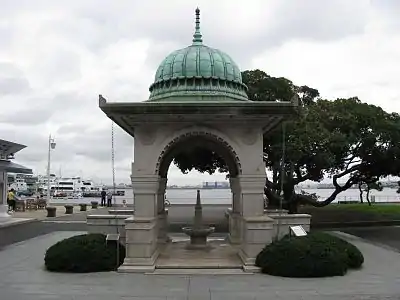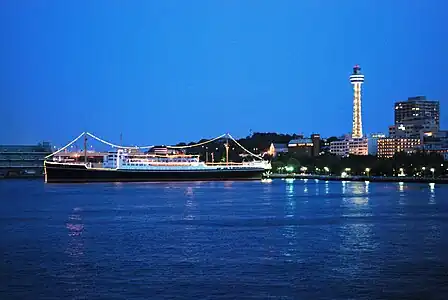| Yamashita Park | |
|---|---|
 | |
| Location | Naka-ku, Yokohama, Japan |
| Coordinates | 35°15′52″N 139°23′09″E / 35.2644°N 139.3859°E |
| Area | 74,121 square metres (797,830 sq ft) |
| Created | 1930 |
| Yamashita Park | |||||
|---|---|---|---|---|---|
| Japanese name | |||||
| Kanji | 山下公園 | ||||
| Hiragana | やました こうえん | ||||
| Katakana | ヤマシタ コウエン | ||||
| |||||
Yamashita Park (山下公園, Yamashita Kōen) is a public park in Naka Ward, Yokohama, Japan, famous for its waterfront views of the Port of Yokohama.
History
Much of Yokohama was destroyed on September 1, 1923, by the Great Kantō earthquake.[1] A Scotsman, Marshall Martin, advisor to Mayor Ariyoshi Chuichi, is credited with persuading the city government to use rubble from the Kannai commercial district to reclaim the former waterfront as a park.[2]
Yamashita Park was formally opened on March 15, 1930.
The park was requisitioned in 1945 during the Occupation of Japan for military housing, reverting to Japanese control in 1960. Across the street from the park is the Hotel New Grand where General Douglas MacArthur spent his first night on his arrival in Japan on August 30, 1945.
Park attractions
As well as public green space with trees, flower beds, fountains and memorials, Yamashita Park is also noted as the location of:
- The Ōsanbashi Pier, a pier on which is built the Yokohama passenger ship terminal, which has been in continuous operation since 1896, with major renovations in 1964 and 2002.
- The Hikawa Maru, a Japanese ocean liner built in 1929 for Nippon Yūsen Kabushiki Kaisha ("NYK Line") now a museum ship.
- The Port Service, an operator of seabuses, excursion and restaurant ships, operating from the park pier. Ship services include scheduled public lines as far as Yokohama Station as well as larger charter ships.
- The Guardian of Water, a Donal Hord sculpture gifted by Yokohama's sister city San Diego in 1960. A replica of the sculpture located in front of the San Diego County Administration Center.
- Yokohama Indian Water Fountain. Donated by the local Indian community to show its gratitude to the Japanese for aiding the Indian survivors after the 1923 Great Kantō earthquake, as well as to remember those who perished in the disaster.[3]
- Girl Scout Statue - Dedicated March 18, 1962 on the Fiftieth Anniversary of the founding of the Girl Scouts. (two of the three models for the statue are Libby Watson and Hiroko Tanaka)[4]
- Statue of the Girl with Red Shoes (Akai Kutsu)
- Monument of the Children's Song "Seagull Sailor Man"[5]
- Monument of General Artemio Ricarte - Philippine General, erected in 1972[6]
 The Indian Water Fountain remembers those who perished in the 1923 Great Kanto Earthquake, including more than 90 Indians.
The Indian Water Fountain remembers those who perished in the 1923 Great Kanto Earthquake, including more than 90 Indians.
- Several scenes inside the park, 2023
References
- ↑ Hammer, Joshua (2006). Yokohama Burning: The Deadly 1923 Earthquake and Fire that Helped Forge the Path to World War II. p. 143. ISBN 9780743264655.
- ↑ Sabin, Burritt (2002). A Historical Guide to Yokohama. Yokohama: Yurindo Co. Ltd. p. 51. ISBN 4-89660-172-6.
- ↑ "Chandru G. Advani, 1924-2018: 'Uncle' to Japan's Indian community". 21 March 2018.
- ↑ "Girl Scouts who posed for Yokohama statue reunited 52 years later". 12 November 2014.
- ↑ "Yokohama Official Visitors Guide - Travel Guide to Yokohama City".
- ↑ "AOL Travel - Deals, Discounts and Things to do".